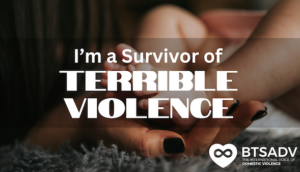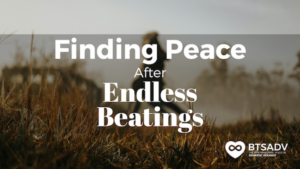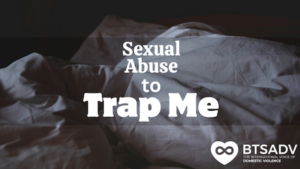The estimated annual number of domestic violence incidents in the U.S. far surpasses the number of reported cases each year. It is estimated that more than ten million adults experience domestic violence in the U.S. annually. Yet, only between 960,000 and 3,000,000 incidents are reported each year. Reporting on a domestic violence incident or breaking the silence is likely to precipitate a series of events and reactions that current victims might not be prepared to deal with.
Consequences of Breaking The Silence
Speaking out may cause the abuser to become more violent and even lethal if they perceive an upcoming break-up. If the abuser is the main income-earner, it might trigger a separation. This could deprive the victim of financial support and confronts them with single-parenthood challenges.
Personal Challenges As A Survivor
Breaking the silence presents survivors with their own challenges. There may be a fear of other people’s negative judgment or post-traumatic stress disorder (PTSD). Survivors can emotional distress of dealing with painful memories. There may be a desire to protect the abuser. These challenges can stop survivors from sharing their own experiences with domestic violence.
Challenges As A Witness
Reporting on a domestic violence incident can be challenging for witnesses of domestic violence as well. A recent study of intimate partner homicides found that 20% of domestic-violence-related homicides were not victims. Rather, it was family members, friends, neighbors, people who intervened, law enforcement responders, or bystanders. Journalists who write pieces on domestic violence cases receive threats and angry calls from abusers and their families.
Consequences of Remaining Silent
Speaking out about and against domestic violence is a challenging path for anyone who chooses to do so. However, the consequences of remaining silent are arguably even more dire and simply cannot be tolerated. In the U.S., 1 in 2 female and 1 in 13 male murder victims are killed by intimate partners. 65% of all murder-suicides are perpetrated by intimate partners. Intimate partner femicide has increased in recent years, due to an increase in femicide committed with a firearm. Additionally, 1 in 10 women and 1 in 50 men have experienced stalking by an intimate partner during their lifetime.
Nearly 1 in 5 women and 1 in 12 men have experienced contact sexual violence by an intimate partner in their lifetime. Between 21-60% of victims of intimate partner violence lose their jobs due to reasons stemming from the abuse. Finally, intimate partner victimization is correlated with a higher rate of depression and suicidal behavior.
Break The Silence Becomes Life Or Death
What is at stake with breaking the silence against domestic violence, then, is life and death. Our voice has the power to save lives, end ongoing, long-lasting cycles of family abuse, stop intimate partner stalking. We can reduce the prevalence of sexual assault in and outside intimate relationships. Our voice can help victims maintain or regain their job and financial independence. We are able to improve victims’ mental health and alleviate cases of PTSD by speaking up about domestic violence. Using our voice, we can protect children from aggression and traumatic events that can haunt them into adulthood.
The sheer prevalence of domestic violence across the globe may make us feel small and unable to contribute to its eradication. However, breaking the silence as a solution to IPV is neither a single act nor a one-person job; it consists of a series of actions that complement and build off of each other.
Where Does Break The Silence Start
It starts with education. What are the red-flags in abusive relationships, and how to spot and avoid them? What is a strong, loving relationship? Why do abusers engage in violent actions, and what can social institutions do to stop them? What are the dynamics of abusive relationships, and why do some victims stay? How should victims, survivors, bystanders, governments act in response to domestic violence? Many genuinely do not know the answers to these questions or haven’t pondered them deeply enough. How could they, when schools, family and acquaintances, and society at large, haven’t properly informed them about IPV?
Survivors who share their personal stories effectively become public educators, shedding the much-needed light on IPV for those who want to help but just don’t know how or why also inspiring current victims to take action and begin their healing process. Researchers who publish reports on the effects of government policies and interventions on domestic violence refine our pool of knowledge, and we, the readers who seek out reliable information on IPV, help establish a more educated and aware society.
Breaking the silence equips us with the knowledge required to take informed actions against domestic violence. These may take on any shape and form, and no initiative is too small.
Educate Your Community
You may use your knowledge on IPV to teach teenagers about domestic violence and healthy relationships at your local schools, or you may post articles online or hand out fliers with statistics and insights on domestic violence.
So, now your local teenagers are informed about IPV, but law enforcement might not have the human and financial resources to properly detect every domestic violence incident in their jurisdiction. By reporting incidents you help them perform their job better. Once victims escape abusers, their domestic violence situation is dealt with according to a specific set of laws that aren’t always victim-friendly or informed. So, you may protest or lobby for legislation that properly protects victims and for institutions that take domestic violence seriously.
Start The Conversation
What about deep-rooted cultures of victim-blaming and privilege that allow abusers to continue inflicting harm on others? Breaking the silence starts regional and national conversations on ending these maladaptive cultural habits and replacing them with healthier, more inclusive ones.
Volunteer Your Time
You may want to lend out victims a helping hand directly and volunteer with a domestic violence hotline or a victim shelter. Shelters for domestic violence victims are usually under-funded, so you may, alternatively, want to collect funding yourself or pressure local institutions to make donations. Of course, those funds are only made available by those who believe in eradicating domestic violence, that is, those who are educated on the issue. This brings us back to the relevance of breaking the silence on domestic violence by sharing personal stories, statistics, reports, thoughts, and any insight.
You, along with your team of helpers, are a crucial part of this breaking-the-silence-chain that victims and society at large rely on for a future where no person is subject to abuse from the people closest to them. Whether it’s one-hour taking calls with a hotline, one fund-raiser, one post, one article–whatever you feel capable of doing, it matters. Every piece adds up and contributes to breaking the silence and saving lives.
Photo Credit: Michael Dam, via Unsplash









